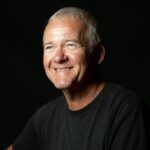Murray McLauchlan
Very popular in Canada, McLauchlan, Murray (Edward). Singer, songwriter, guitarist, pianist, harmonica player, born Paisley, Renfrewshire, Scotland, 30 Jun 1948.
Brought to Canada at five, McLauchlan was taught to play folk guitar by Jim McCarthy and began his career in Toronto’s Yorkville coffeehouses at 17, making his first major appearance at the Mariposa Folk Festival in 1966. His early ‘Child’s Song’ and ‘Old Man’s Song’ were recorded by the US singer Tom Rush. McLauchlan continued to work in Ontario and Quebec coffeehouses and briefly 1970-1 in New York, until the success of his albums and the popularity of his ‘Farmer’s Song’ resulted in 1973 in the first of regular concert tours across Canada and in appearances in the USA with Neil Young and, beginning in 1974, on his own. With Bruce Cockburn he toured Japan in 1977. For the most part, however, McLauchlan has conducted his career in Canada, giving some 150 concerts a year through the 1980s, singing at folk festivals (eg, at Winnipeg in 1982, 1984, 1988, and 1990), and making a point of performing in small communities as well as the larger cities. He also has appeared in many benefit concerts and telethons.
McLauchlan’s early folk following was soon augmented by a growing country audience. ‘Farmer’s Song’ brought him Juno Awards for folk and country singles and as composer of the year in 1973. Several of his songs have been popular on country radio – eg, ‘Shoeshine Workin’ Song’ (1974), ‘Maybe Tonight’ (1975), ‘Down by the Henry Moore’ (1975), ‘Never Did Like that Train’ (1983), ‘Red River Flood’ and ‘Railroad Man’ (1984), ‘I’m Best at Lovin’ You’ (1986) and ‘Love with a Capitol “L”‘ (1989). Other songs have been more successful in the pop maintream – eg, ‘Hurricane of Change’ (1973), ‘Linda Won’t You Take Me In’ (1974), ‘Do You Dream of Being Somebody’ and ‘Little Dreamer’ (1975), and ‘Whispering Rain’ (1979). McLauchlan also dallied with rock 1976-7 with the Silver Tractors and again in 1981 with the Lincolns.
Irrespective of these stylistic variables, which have been recurring rather than successive motifs in his work, his songwriting has remained constant to the folk tradition. Greg Quill (Toronto Star, 8 Oct 1983) noted, ‘over the years, his patently populist approach has endeared him to a solid working-class audience’ and referred to McLauchlan’s ‘lean, streetwise narratives, of which the finest examples are Farmer’s Song, Honky Red and Down by the Henry Moore – all genuine urban folksongs…’. McLauchlan’s early singing style was characterized by a degree of reverse affectation, a toughness and twang that corresponded with his view of, and from, the underclass. His later songs and singing grew more personal in tone.
For CBC radio’s ‘Simply Folk’ in 1984 McLauchlan prepared the 13-week ‘Timberline’ series of original songs about Canada’s unsung heroes – a trapper, tugboat operator, aviation pioneer, etc. The songs were included on the LP Heroes. He returned to the hinterland theme for the CBC TV travelogue/music video Floating Over Canada in 1985. McLauchlan was subsequently host 1989-92 for CBC radio’s ‘Swinging on a Star,’ devoted to Canadian songs and songwriters. His own ‘Farmer’s Song’ has been recorded by Ocean Fancy, Walter Ostanek, Merv Smith, and R. Harlan Smith; other McLauchlan titles have appeared on albums by David Bromberg, Judy Lander, Bob Neuwirth, Three’s A Crowd, and David Wiffen. His ‘If the Wind Could Blow My Troubles Away’ was chosen as the worldwide theme song in 1981 for the International Year of Disabled Persons.
McLauchlan received other Junos in 1976, 1977, and 1980, annually 1984-6 and again in 1988 as country male singer of the year, and in 1979 as folksinger of the year. He won a Big Country Award in 1985 as male singer of the year.
Article taken from www.canadianencyclopedia.ca
“The Canadian Encyclopedia © Copyright 2005, Historica Foundation of Canada”



